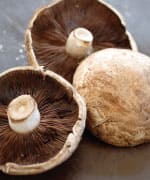Life Extension Magazine®
Visceral Fat Decrease Linked with Higher Carotenoid Levels

A study reported in Nutrients revealed an association between higher levels of carotenoids and a reduction in visceral fat area.*
The investigation included 310 men and 495 women who received an annual health examination as part of the Iwaki Health Promotion Project in Japan. Blood samples were analyzed for the carotenoids alpha carotene, beta carotene, beta cryptoxanthin, lycopene, lutein and zeaxanthin. Diet-history questionnaire responses provided information concerning food intake.
Total carotenoid levels were associated with the intake of leafy green vegetables, carrots and pumpkins, root vegetables and juice. Women’s carotenoid levels were significantly higher than those of men.
Higher total carotenoid levels were associated with decreased visceral fat area and BMI in women, independent of fiber intake. Increased beta carotene, beta cryptoxanthin and lutein levels in women were also associated with a lower visceral fat area.
Editor’s Note: “This suggests that consumption of a diet rich in carotenoids (especially lutein and beta-carotene) is associated with lower visceral fat area, which is a good predictor of cardiovascular disease, especially in women,” the authors stated.
* Nutrients. 2021 Mar 11;13(3):912.
Women’s Sexual Well-Being Improves with Testosterone Replacement

Women who receive testosterone hormone replacement have improved sexual function and well-being, according to a review and meta-analysis published in The Lancet Diabetes & Endocrinology.*
Researchers studied 46 reports regarding 36 randomized trials with a total of 8,480 female subjects (the majority of whom were postmenopausal). The trials looked at the effects of testosterone on female sexual function, compared to a placebo, or other hormone replacement.
Compared to the control subjects, women who received testosterone experienced improvements in sexual desire, arousal, responsiveness to stimuli, self-image, orgasm, and pleasure, and felt less concern and distress about sex.
Editor’s Note: Women can increase their testosterone levels by using prescription 150 mcg testosterone patches or try 15 mg a day of DHEA that often boosts testosterone levels in women (but not much in men). DHEA is a low-cost supplement whereas testosterone patches are prescription drugs.
* Lancet Diabetes Endocrinol. 2019 Oct;7(10): 754-766.
Gut Microbiome Connected to Alzheimer’s Disease

In an animal study, scientists identified a connection between the composition of the gut microbiome and Alzheimer’s disease, according to an article published in Scientific Reports.*
Researchers compared wild mice with those genetically engineered to carry genes associated with Alzheimer’s. They found a connection between gut composition (based on fecal pellets) and behavioral and cognitive performance in these mice.
They also observed a correlation between changes in the gut microbiome and epigenetic regulation of two genes associated with Alzheimer’s disease (the apolipoprotein E and Tomm40 genes).
This means the composition of the gut microbiome could play a role in turning on genes that contribute to Alzheimer’s disease. Importantly, these changes occurred in the hippocampus, the area of the brain impacted by Alzheimer’s.
These findings are consistent with an observational study of people with Alzheimer’s disease.
Editor’s Note: “The exciting part of this is that you can manipulate the gut microbiome,” said senior author Jacob Raber, MD. “We can use probiotics and see what the effect is.”
* Sci Rep 2021 Feb 25;11(1):4678.
Ashwagandha Root Extract Boosts Cognitive Function

Ashwagandha root extract was shown to improve memory and cognitive function in people with mild cognitive impairment, according to a study published in the Journal of Dietary Supplements.*
This double-blind, randomized, placebo-controlled study included 50 adults over age 35 who reported having symptoms of mild cognitive impairment (such as forgetfulness, feeling overwhelmed with decision-making, and drifting thoughts).
The treatment group received 300 mg of ashwagandha root extract twice daily, and the control group received a placebo.
After eight weeks, the ashwagandha group experienced significantly greater improvements in general memory (recall of items such as geometric designs and faces) and immediate memory (the ability to recall information over a few seconds, such as a person’s name or a telephone number), compared to the placebo group.
The ashwagandha group also experienced greater improvements in executive function, sustained attention, and information processing speed.
Editor’s Note: The researchers concluded, “Ashwagandha may be effective in enhancing both immediate and general memory in people with mild cognitive impairment as well as improving executive function, attention, and information processing speed.”
* J Diet Suppl. 2017 Nov 2;14(6):599-612.
Shiitake Mushrooms Boost Immunity

Eating shiitake mushrooms on a regular basis improves immune function, according to a study published in the Journal of the American College of Nutrition.*
For the study, 52 healthy adults between 21 and 41 years old were given a four-week supply of either 5 grams or 10 grams of dry shiitake mushrooms.
They cooked the mushrooms at home and consumed a serving every day as instructed.
After four weeks, compared to baseline, researchers observed increases in:
- Gamma delta T cells, thought to serve as one of the immune system’s first lines of defense in epithelial and mucosal tissues,
- NK-T (natural killer-T) cells, a type of immune cell which promotes the activity that helps defend against infection, and
- Secretory IgA (sIgA) production, which protects the nasal mucosa and respiratory tract mucosal surfaces from infection.
Reductions in C-reactive protein (CRP) and increases in anti-inflammatory cytokines were also seen, suggesting lower inflammation.
The researchers concluded that regular consumption of shiitake mushrooms resulted in improved immunity.
Editor’s Note: Shiitake mushrooms could also boost heart health, as they contain beta glucans, a type of fiber that can help lower cholesterol.
*J Am Coll Nutr. 2015;34(6):478-87.

